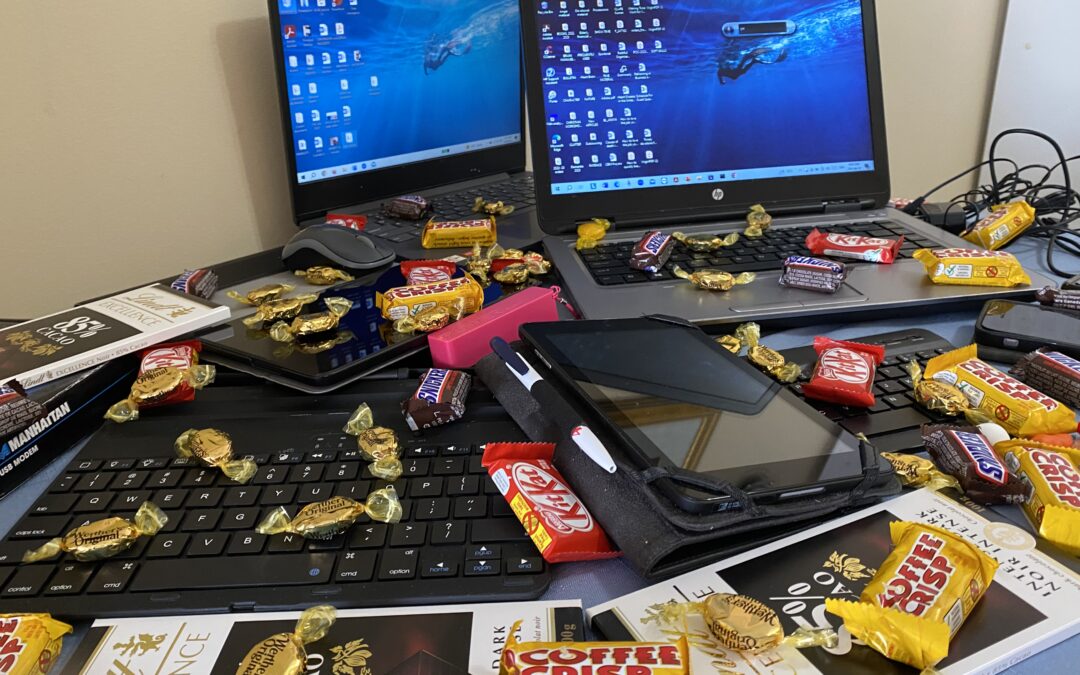In my last blog article, I suggested cutting back on screen time and re-introducing more paper into your life. Of course, handwriting is slower, but for me that’s another benefit since it allows time to think while I write. From the time I decide what to write until my pen hits the paper, I have already edited what I want to say. I find there’s a lot less editing to do on handwritten pages than those typed directly onto a computer screen. And the subsequent dictating to my laptop takes place as quickly as I read, with about 99% accuracy. That sure beats my typing speed. One final edit is all it needs.
I’m not saying what I produce is top of the line writing. That varies with the individual writer. And I’m no perfectionist. I let the time spent reviewing and editing vary with the importance of the project. So, a manuscript aimed at a major publisher is more carefully written and edited than an article for my blog or newsletter. I believe the amount of time invested in any task should be proportionate to the value of the output. Of course, that’s my time management training kicking in, and may not apply to the more artistic people. The volume of output usually only relates to productivity and money, not aesthetics. You can’t put a price on a cleverly crafted phrase.
I ended my last article with the statement that too much of a good thing is not a good thing. This proverb has existed since the 1500s and suggests that the quality of something is relative to its quantity, but not always in a positive way. This is not only true for the use of technology such as smartphones, social media, and the Internet. Other good things can work against you if they are used too frequently or exist in an overabundance. For instance, certain medications taken to keep you well can be harmful if taken in excess. So can certain foods. Tuna, for example, can have healthy fats to offer, but is associated with a high mercury content, especially canned tuna. And tasty French fries if eaten more than twice a week can increase your risk of mortality twofold. Studies have shown that diets high in trans fats can lead to poor memory, reduced processing skills and poor comprehension.
Technology is no exception. Although it may seem hypocritical for a so-called time management expert to suggest we spend more time completing tasks, projects or activities, there are things more important than saving time – and one of them is health. This refers to the health of body, mind, and spirit. Speed, multitasking, frenetic activity, racing the clock to meet deadlines, all create stress and have a negative impact on our health and well-being. They are especially counterproductive for those with ADHD-like traits and weak executive skills. Someone who is blamed for frequently missing deadlines could just as well blame the deadlines for being unrealistic.
Those who have read my books and articles or attended my workshops know that for over 40 years I’ve been recommending that extra time be allowed when scheduling tasks or activities. Whenever I block time in my planner to work on a task, I schedule up to 50 percent more time than the task is expected to take. This could be more or less, depending on the individual, the working environment, and the task itself.
If we take on too much, we could accomplish too little. Most of us would be better off if we tried doing a little less a little better. And we should not concentrate on doing more things but on more important things.
I’m convinced that the digital age places a heavier burden on the executive skills and consumes more personal energy. The Internet, e-mail, texting, and social media are now a fact of life. But any negative effects of a high-tech environment can be neutralized somewhat by incorporating a few high-touch systems into your personal and business life. These could include a paper planner, To-Do lists, handwritten notes, and checklists – all things that aid working memory, focus and attention. You’re no less progressive by doing this.
Because we now live in a digital age of speed, I’m almost embarrassed to admit that I handwrite all my books and articles. But I quickly regain my self-esteem when I recall the story of the tortoise and the hare. The objective was clearly not to run the fastest, but to win the race. I am not in any race, nor in a hurry to rush through life. But I have managed to have over 40 eBooks published by Bookboon so far, plus a dozen or so paperback or hardcopy books published by other book publishers, and several that I have self-published. Not bad, considering my main activities in life have been consulting, speaking, and training. And it leaves plenty of time for volunteering and leisure activities.
Companies who profit from high-tech devices may, of course, downplay, ignore, or deny any negative or harmful side effects of technology. But we must not ignore the results of studies simply because the research was conducted five or ten years ago – unless it has been proven to be false or in error. The original study that discovered handwashing is one of the most important tools in public health took place over 175 years ago. It was also downplayed, ignored, or denied at the time. But it still keeps kids from getting the flu, prevents the spread of disease and keeps infections at bay.
In my next blog article, I will refer to some research and studies that indicate the possible harm that could result from excessive use of technology, and how you can avoid it. That is, besides re-introducing a little more paper into your life.


Recent Comments